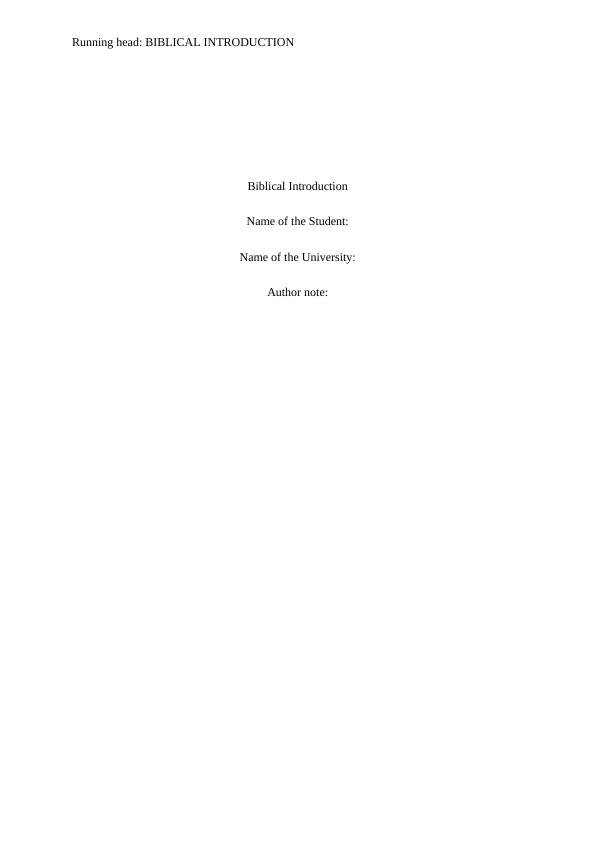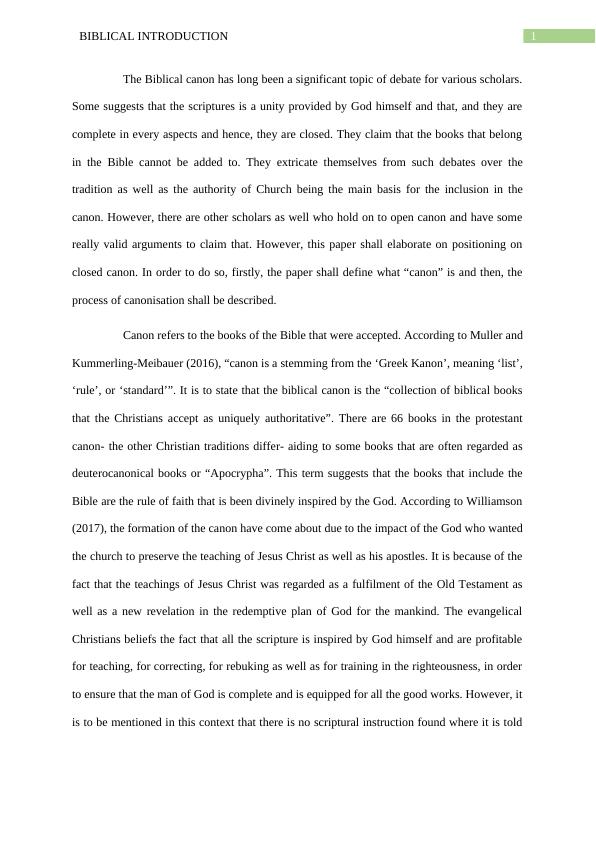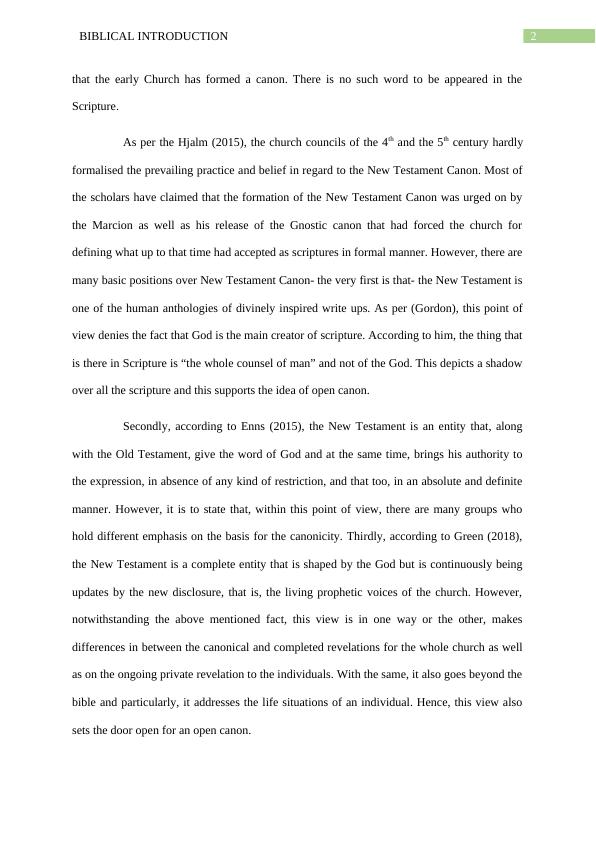Biblical Introduction: Understanding the Debate on Closed Canon
Added on 2023-05-30
7 Pages1964 Words298 Views
Running head: BIBLICAL INTRODUCTION
Biblical Introduction
Name of the Student:
Name of the University:
Author note:
Biblical Introduction
Name of the Student:
Name of the University:
Author note:

1BIBLICAL INTRODUCTION
The Biblical canon has long been a significant topic of debate for various scholars.
Some suggests that the scriptures is a unity provided by God himself and that, and they are
complete in every aspects and hence, they are closed. They claim that the books that belong
in the Bible cannot be added to. They extricate themselves from such debates over the
tradition as well as the authority of Church being the main basis for the inclusion in the
canon. However, there are other scholars as well who hold on to open canon and have some
really valid arguments to claim that. However, this paper shall elaborate on positioning on
closed canon. In order to do so, firstly, the paper shall define what “canon” is and then, the
process of canonisation shall be described.
Canon refers to the books of the Bible that were accepted. According to Muller and
Kummerling-Meibauer (2016), “canon is a stemming from the ‘Greek Kanon’, meaning ‘list’,
‘rule’, or ‘standard’”. It is to state that the biblical canon is the “collection of biblical books
that the Christians accept as uniquely authoritative”. There are 66 books in the protestant
canon- the other Christian traditions differ- aiding to some books that are often regarded as
deuterocanonical books or “Apocrypha”. This term suggests that the books that include the
Bible are the rule of faith that is been divinely inspired by the God. According to Williamson
(2017), the formation of the canon have come about due to the impact of the God who wanted
the church to preserve the teaching of Jesus Christ as well as his apostles. It is because of the
fact that the teachings of Jesus Christ was regarded as a fulfilment of the Old Testament as
well as a new revelation in the redemptive plan of God for the mankind. The evangelical
Christians beliefs the fact that all the scripture is inspired by God himself and are profitable
for teaching, for correcting, for rebuking as well as for training in the righteousness, in order
to ensure that the man of God is complete and is equipped for all the good works. However, it
is to be mentioned in this context that there is no scriptural instruction found where it is told
The Biblical canon has long been a significant topic of debate for various scholars.
Some suggests that the scriptures is a unity provided by God himself and that, and they are
complete in every aspects and hence, they are closed. They claim that the books that belong
in the Bible cannot be added to. They extricate themselves from such debates over the
tradition as well as the authority of Church being the main basis for the inclusion in the
canon. However, there are other scholars as well who hold on to open canon and have some
really valid arguments to claim that. However, this paper shall elaborate on positioning on
closed canon. In order to do so, firstly, the paper shall define what “canon” is and then, the
process of canonisation shall be described.
Canon refers to the books of the Bible that were accepted. According to Muller and
Kummerling-Meibauer (2016), “canon is a stemming from the ‘Greek Kanon’, meaning ‘list’,
‘rule’, or ‘standard’”. It is to state that the biblical canon is the “collection of biblical books
that the Christians accept as uniquely authoritative”. There are 66 books in the protestant
canon- the other Christian traditions differ- aiding to some books that are often regarded as
deuterocanonical books or “Apocrypha”. This term suggests that the books that include the
Bible are the rule of faith that is been divinely inspired by the God. According to Williamson
(2017), the formation of the canon have come about due to the impact of the God who wanted
the church to preserve the teaching of Jesus Christ as well as his apostles. It is because of the
fact that the teachings of Jesus Christ was regarded as a fulfilment of the Old Testament as
well as a new revelation in the redemptive plan of God for the mankind. The evangelical
Christians beliefs the fact that all the scripture is inspired by God himself and are profitable
for teaching, for correcting, for rebuking as well as for training in the righteousness, in order
to ensure that the man of God is complete and is equipped for all the good works. However, it
is to be mentioned in this context that there is no scriptural instruction found where it is told

2BIBLICAL INTRODUCTION
that the early Church has formed a canon. There is no such word to be appeared in the
Scripture.
As per the Hjalm (2015), the church councils of the 4th and the 5th century hardly
formalised the prevailing practice and belief in regard to the New Testament Canon. Most of
the scholars have claimed that the formation of the New Testament Canon was urged on by
the Marcion as well as his release of the Gnostic canon that had forced the church for
defining what up to that time had accepted as scriptures in formal manner. However, there are
many basic positions over New Testament Canon- the very first is that- the New Testament is
one of the human anthologies of divinely inspired write ups. As per (Gordon), this point of
view denies the fact that God is the main creator of scripture. According to him, the thing that
is there in Scripture is “the whole counsel of man” and not of the God. This depicts a shadow
over all the scripture and this supports the idea of open canon.
Secondly, according to Enns (2015), the New Testament is an entity that, along
with the Old Testament, give the word of God and at the same time, brings his authority to
the expression, in absence of any kind of restriction, and that too, in an absolute and definite
manner. However, it is to state that, within this point of view, there are many groups who
hold different emphasis on the basis for the canonicity. Thirdly, according to Green (2018),
the New Testament is a complete entity that is shaped by the God but is continuously being
updates by the new disclosure, that is, the living prophetic voices of the church. However,
notwithstanding the above mentioned fact, this view is in one way or the other, makes
differences in between the canonical and completed revelations for the whole church as well
as on the ongoing private revelation to the individuals. With the same, it also goes beyond the
bible and particularly, it addresses the life situations of an individual. Hence, this view also
sets the door open for an open canon.
that the early Church has formed a canon. There is no such word to be appeared in the
Scripture.
As per the Hjalm (2015), the church councils of the 4th and the 5th century hardly
formalised the prevailing practice and belief in regard to the New Testament Canon. Most of
the scholars have claimed that the formation of the New Testament Canon was urged on by
the Marcion as well as his release of the Gnostic canon that had forced the church for
defining what up to that time had accepted as scriptures in formal manner. However, there are
many basic positions over New Testament Canon- the very first is that- the New Testament is
one of the human anthologies of divinely inspired write ups. As per (Gordon), this point of
view denies the fact that God is the main creator of scripture. According to him, the thing that
is there in Scripture is “the whole counsel of man” and not of the God. This depicts a shadow
over all the scripture and this supports the idea of open canon.
Secondly, according to Enns (2015), the New Testament is an entity that, along
with the Old Testament, give the word of God and at the same time, brings his authority to
the expression, in absence of any kind of restriction, and that too, in an absolute and definite
manner. However, it is to state that, within this point of view, there are many groups who
hold different emphasis on the basis for the canonicity. Thirdly, according to Green (2018),
the New Testament is a complete entity that is shaped by the God but is continuously being
updates by the new disclosure, that is, the living prophetic voices of the church. However,
notwithstanding the above mentioned fact, this view is in one way or the other, makes
differences in between the canonical and completed revelations for the whole church as well
as on the ongoing private revelation to the individuals. With the same, it also goes beyond the
bible and particularly, it addresses the life situations of an individual. Hence, this view also
sets the door open for an open canon.

End of preview
Want to access all the pages? Upload your documents or become a member.
Related Documents
Theology Essay on Canonisation for Biblical Studieslg...
|8
|2619
|291
The Mission of God: Unlocking the Bible's Grand Narrativelg...
|5
|1223
|405
By What Criteria Did the Early Church Fix the New Testament Canon Essaylg...
|9
|2524
|337
Concepts of Inerrancy, Infallibility and Authority of the Biblelg...
|9
|2416
|254
Jesus the Christ: A Study on Christology and Atonementlg...
|9
|2640
|309
Assignment about Scripture and Truthlg...
|6
|1000
|22
